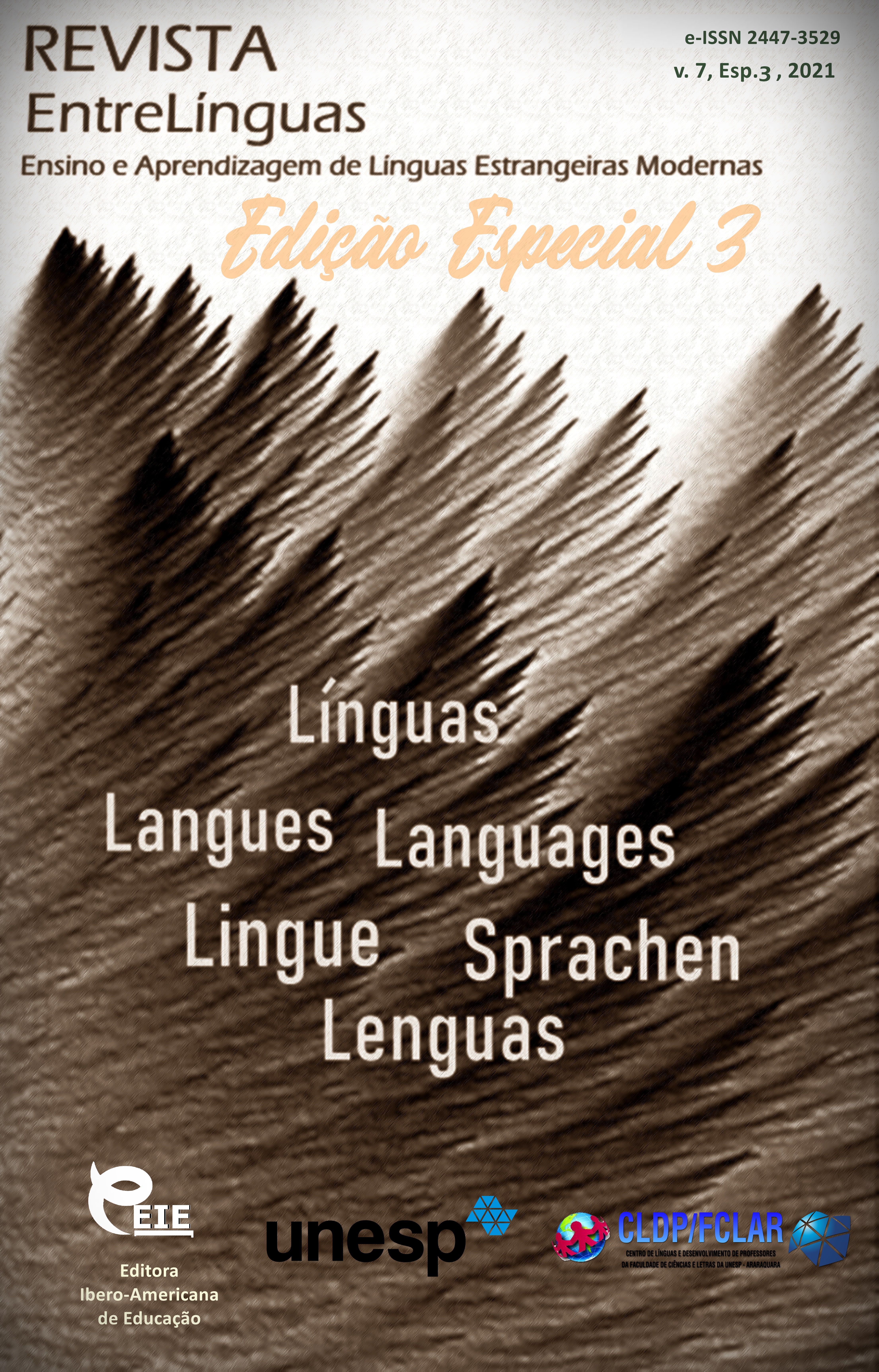Developing intercultural foreign language communication via case study technology
DOI:
https://doi.org/10.29051/el.v7iesp.3.15705Keywords:
Intercultural, Communication, University, Student, Education, Foreign language, Case study technologyAbstract
Profound structural changes in the economy, increasing saturation and awareness of the population, internationalization of various spheres of life lead to the need to create a variety of opportunities for education and self-education of young people in intercultural foreign language communication. In this regard, one of the leading technologies which help to promote intercultural foreign language communication is case study technology. The case-method is based on the acquisition of sets (cases) of text teaching materials and transfer them to students for self-study. The main aim of the research work is to study the effectiveness of case study technology for promoting autonomous learners in intercultural foreign language communication. The author reveals the concept of case study technology in foreign language learning, distinguish four main stages of using case study technology for promoting autonomous learners in foreign language education: preparatory stage, introductory, main stage and final. It is concluded that the use of case study technology for promoting autonomous learners in intercultural communication promotes the development of internal motivation of student to educate and self-educate; the development of creative thinking, activity and autonomous work of students; the consolidation of the knowledge and skills necessary for the formation of self-educational activities; reflection on their self-educational activity. The results and conclusions of the presented paper can be used by teachers and lecturers at the English classes, seminars and in lecture courses such as “Technologies of foreign language teaching in primary schools”, “Theory of foreign language teaching”.
Downloads
References
ABROSIMOVA, G. et al. Blended learning in university education. Humanities & Social Sciences Reviews, v. 7, n. 6, p. 06-10, 2019.
CHOSHANOV, M. A. Engineering of training technologies. Moscow: «Binom», 2015. Available: http://bookash.pro/ru/book/193905/inzheneriya-obuchayuschih-tehnologii-m-a-choshanov. Access: 10 Dec. 2020.
DEWEY, J. Education and democracy. New York, 1916.
GORBUNOVA, N. V.; MOKEYEVA, E. V. Innovative educational environment of higher educational institution. Man in India, v. 97, n. 15, p. 21-40, 2017.
HAYES, C. Beyond the american dream. Lifelong learning and the search for meaning in a postmodern world. Wasilla: Autodidactic Press, 1998.
HOFFMAN, T. The meanings of competency. Journal of Europen Industrial Training, v. 23, n. 6, p. 275-285, p. 1999.
HOLEC, H. Autonomy revisited. In: HUTTUNEN, I. (Ed.). Learning to learn languages: investigating learner strategies and learner autonomy. Report of workshop 2B. Heinola, Finland, 1993, 1993. p. 35-38. (Council of Europe, Council for Cultural Cooperation)
HUTMACHER, W. Key competencies for Europe. Report of the Symposium Berne, Switzerland, 1997. (Council for Cultural Co-operation (CDCC)
ILIKOVA, L. Sentiment analysis on english financial news volume 10. In: INTERNATIONAL CONFERENCE ON APPLIED LINGUISTICS ISSUES, 6., 2019, Saint Petersburg. Proceedings […]. Saint Petersburg: ALI2019, 2019. p. 735-744.
JEWELL, M. Real-world contexts, skills and service learning for secondary school language learners. In: HANSON-SMITH, E.; RILLING, S. (Eds.) Learning languages through technology. Alexandria, VA: TESOL, 2006.
KADYROVA, A. A.; VALEEV, A. A. Pedagogical support of non-language high school students' capacity for creative self-realization in foreign language classroom development. International journal of Environmental and Science Education, v. 11, n. 6, p. 1039-1048, 2016.
KHUSAINOVA, R. R.; VALEEV, A. A. Technological aspect of the development of university students foreign language activities. Astra Salvensis, v. 6, p. 746-764, 2018.
KUIMOVA, M. V. The use of case study method in teaching English as a foreign language in technical university. Young Scientist, v. 1-2, n. 2, p. 82-86, 2010.
MUHAMETZYANOVA, G. V. Professional education: systemic approach to the problem. Kazan: «Idel-Press», 2008. 608 p.
SABIROVA, D. R.; KHANIPOVA, R. R. Innovative approaches to teaching and learning English as second and English as foreign language in multilingual education. Humanities and Social Sciences Reviews, v. 7, n. 6, p. 45-48, 2019.
SAGITOVA, R. R. et al. The model of formation of self-directed language learning of university students in a unified higher education area. Humanities and Social Sciences Reviews, v. 7, n. 6, p. 85-88, 2019.
SELWYN, N. Education in a digital world: global perspectives on technology and education. London: Routledge, 2013.
Published
How to Cite
Issue
Section
License

This work is licensed under a Creative Commons Attribution-NonCommercial-ShareAlike 4.0 International License.
Os manuscritos aceitos e publicados são de propriedade da Revista EntreLínguas. Os artigos publicados e as referências citadas na Revista EntreLínguas são de inteira responsabilidade de seus autores.
Transferência de direitos autorais – autorização para publicação
Caso o artigo submetido seja aprovado para publicação, já fica acordado que o(s) autor(es) autoriza(m) a UNESP a reproduzi-lo e publicá-lo na EntreLínguas, entendendo-se os termos “reprodução” e “publicação” conforme definição respectivamente dos incisos VI e I do artigo 5° da Lei 9610/98. O artigo poderá ser acessado pela rede mundial de computadores (Internet), sendo permitidas, a título gratuito, a consulta e a reprodução de exemplar do artigo para uso próprio de quem a consulta, desde que haja a citação ao texto consultado. Essa autorização de publicação 328 EntreLínguas, Araraquara, v. 1, n .2, p. 323-328, jul./dez. 2015 não tem limitação de tempo, ficando a UNESP responsável pela manutenção da identificação do(s) autor(es) do artigo. Os artigos publicados e as referências citadas na Revista EntreLínguas são de inteira responsabilidade de seus autores.











